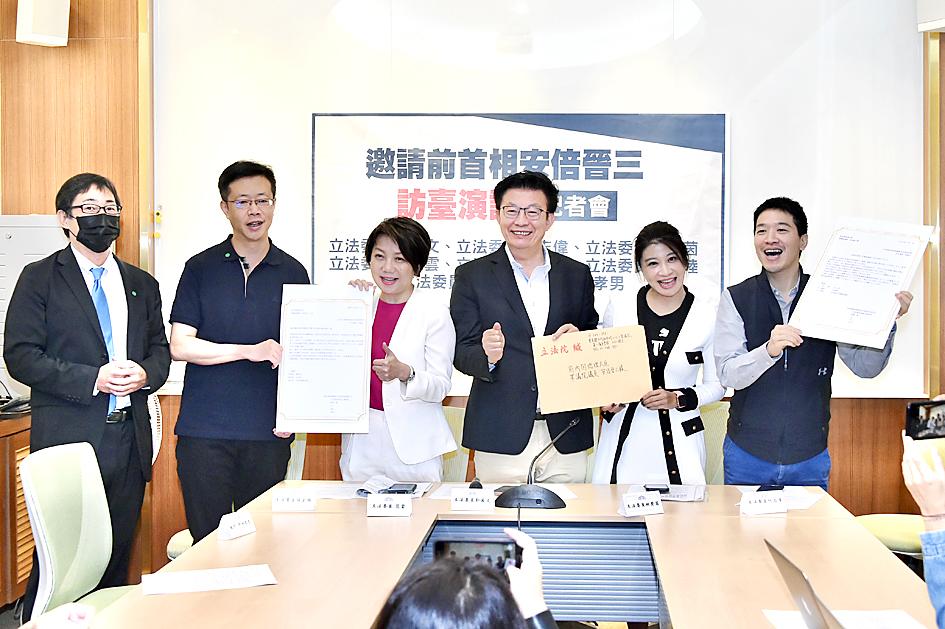The Legislative Yuan’s parliamentary friendship association for the East Asian region yesterday announced that it is officially inviting former Japanese prime minister Shinzo Abe to visit Taiwan next year.
The group held a news conference and presented copies of a letter of invitation for Abe to give a speech at the Legislative Yuan in Taipei.
Next year would be a momentous occasion for Japan, with the nation marking the 10th anniversary of the 2011 Fukushima Dai-ichi nuclear power plant disaster, as well as the proposed staging of the delayed Summer Olympic and Paralympic games, it said.

Photo: Tu Chien-jung, Taipei Times
The letter cited the strong friendship between Taiwan and Japan, and how the two countries have aided each other in times of need.
Democratic Progressive Party (DPP) Legislator Kuo Kuo-wen (郭國文), head of the association, said he believed that next year would be the best time to invite Abe, as he would have had time to recuperate after stepping down as prime minister due to health reasons.
Abe had made it possible for former president Lee Teng-hui (李登輝) to visit and address the Japanese Diet on his views on democracy and other academic topics, DPP Legislator Michelle Lin (林楚茵) said.
The Legislative Yuan, as a representative of Taiwan’s citizenry, is the best proxy in expressing its friendship to other countries, DPP Legislator Fan Yun (范雲) said.
Abe is seen as a political figure who has been most friendly toward Taiwan and the invitation could pave the way for even closer relations between the two nations, she said.
Taiwan and Japan enjoy very friendly non-government relations and a visit by Abe would boost bilateral relations, which is especially heartening as Taiwan is faced with an unfriendly neighbor, DPP Legislator Chang Hung-lu (張宏陸) said.
Chang said he hoped that in the future, high-level government officials from Taiwan and Japan would be able to visit each other.
Ministry of Foreign Affairs spokeswoman Joanne Ou (歐江安) said the ministry would like to thank the association for its contributions to furthering Taiwan-Japan relations.
Abe had on multiple occasions expressed that Taiwan and Japan have shared values, and that Taiwan is a “cherished friend and partner,” she said.
Under Abe, the Japanese government was amenable to Taiwan joining the Comprehensive and Progressive Agreement for Trans-Pacific Partnership and other international bodies, such as the WHO, she added.
The ministry will continue to deepen relations with Japan, while stepping up efforts to enhance ties with Abe and other Japanese officials, Ou said.
Additional reporting by Lu Yi-hsuan

The US government has signed defense cooperation agreements with Japan and the Philippines to boost the deterrence capabilities of countries in the first island chain, a report by the National Security Bureau (NSB) showed. The main countries on the first island chain include the two nations and Taiwan. The bureau is to present the report at a meeting of the legislature’s Foreign Affairs and National Defense Committee tomorrow. The US military has deployed Typhon missile systems to Japan’s Yamaguchi Prefecture and Zambales province in the Philippines during their joint military exercises. It has also installed NMESIS anti-ship systems in Japan’s Okinawa

‘WIN-WIN’: The Philippines, and central and eastern European countries are important potential drone cooperation partners, Minister of Foreign Affairs Lin Chia-lung said Minister of Foreign Affairs Lin Chia-lung (林佳龍) in an interview published yesterday confirmed that there are joint ventures between Taiwan and Poland in the drone industry. Lin made the remark in an exclusive interview with the Chinese-language Liberty Times (the Taipei Times’ sister paper). The government-backed Taiwan Excellence Drone International Business Opportunities Alliance and the Polish Chamber of Unmanned Systems on Wednesday last week signed a memorandum of understanding in Poland to develop a “non-China” supply chain for drones and work together on key technologies. Asked if Taiwan prioritized Poland among central and eastern European countries in drone collaboration, Lin

Renewed border fighting between Thailand and Cambodia showed no signs of abating yesterday, leaving hundreds of thousands of displaced people in both countries living in strained conditions as more flooded into temporary shelters. Reporters on the Thai side of the border heard sounds of outgoing, indirect fire yesterday. About 400,000 people have been evacuated from affected areas in Thailand and about 700 schools closed while fighting was ongoing in four border provinces, said Thai Rear Admiral Surasant Kongsiri, a spokesman for the military. Cambodia evacuated more than 127,000 villagers and closed hundreds of schools, the Thai Ministry of Defense said. Thailand’s military announced that

NO CONFIDENCE MOTION? The premier said that being toppled by the legislature for defending the Constitution would be a democratic badge of honor for him Premier Cho Jung-tai (卓榮泰) yesterday announced that the Cabinet would not countersign the amendments to the local revenue-sharing law passed by the Legislative Yuan last month. Cho said the decision not to countersign the amendments to the Act Governing the Allocation of Government Revenues and Expenditures (財政收支劃分法) was made in accordance with the Constitution. “The decision aims to safeguard our Constitution,” he said. The Constitution stipulates the president shall, in accordance with law, promulgate laws and issue mandates with the countersignature of the head of the Executive Yuan, or with the countersignatures of both the head of the Executive Yuan and ministers or